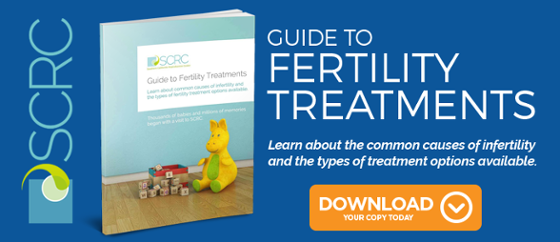
If you are having trouble conceiving naturally and look for help from fertility expert, the first stage is to undergo a series of fertility tests. Your fertility expert will be looking for signs of the underlying cause of your infertility, because every good treatment plan begins with an accurate diagnosis. For many patients, receiving the results of these tests is a source of mixed emotions. It is exciting and hopeful to finally get some answers, but it can also be confusing to enter a new world of medical terminology, statistics, and science. If the results do show a problem, it can be frightening to wonder what they mean for your dreams of having a baby. One of the most common and most important tests your doctor is likely to order is a blood test to measure your FSH level. When the test comes back with elevated FSH levels, it is common to have a whole new set of questions. Here’s what you need to know.
What is FSH and what does it mean to have a high FSH level?
FSH is the abbreviation for Follicle Stimulating Hormone, which is produced by the pituitary gland. FSH is one of the most important hormones involved in ovulation, and is responsible for helping your ovaries mature eggs every cycle. Your FSH level varies throughout your cycle, and as you might expect, is highest just before ovulation. You might expect that this means that a high FSH level is a positive indication for fertility, but unfortunately, it is not.High FSH is a symptom, not a disease or root cause of infertility. However, it often indicates a common but serious problem. Elevated FSH levels are usually a sign that your body is working harder than normal to produce and release an egg: your body will normally produce more FSH until you ovulate, and if you do not ovulate, it will just continue producing FSH indefinitely. Consequently, an abnormally high FSH level can indicate that you are suffering from diminished ovarian reserve or at very high numbers over 40 it may indicate that you have entered menopause.
Can anything else cause a high FSH level?
In rare cases, elevated FSH can point to a genetic or physical problem affecting the adrenal and pituitary glands. Congenital adrenal hyperplasia is an inherited disorder which can affect the way the body produces hormones, and can result in raised FSH levels. Pituitary tumors are usually benign (non cancerous) but can also affect the way that the pituitary produces hormones, including FSH.
Are there ways to lower my FSH levels?
Again, the high FSH level is not what is causing infertility, it is a symptom which points to the cause: usually diminished ovarian reserve. Generally when someone talks about “reducing FSH” what they really mean is “increasing ovarian function.” At the current time, research is inconclusive about whether there are effective ways to support aging ovaries so that they can produce higher quality eggs. There are some lifestyle changes which are recommended to help improve egg quality, and some research in China has suggested that acupuncture, herbs, and other treatments from traditional Chinese medicine could improve ovarian health and thereby lower FSH. In western medicine, there are some early results from small studies which indicate that supplementing with a hormone known as dehydroepiandrosterone (DHEA) before IVF treatment may be helpful for women with diminished ovarian reserve. If you are considering adding any alternative or complementary treatments to your plan, it is very important to discuss this with your fertility doctor. Especially in the case of herbs and supplements, you need to make sure that there are no potentially unsafe interactions between your treatments and medications. The best case scenario is for you, your doctor, and your acupuncturist, herbalist, and/or nutritionist to work together as a team.
How can fertility treatments help me if my FSH levels are too high? What are my options?
Elevated FSH can be a serious issue because IVF treatment works best when used with a high quantity of high quality eggs, and high FSH usually indicates a problem with a patient’s egg supply Women with elevated FSH often respond poorly to fertility medications, which often means that the egg retrieval process yields few eggs, or poor quality eggs with chromosomal abnormalities which will not produce viable embryos. As a result, the prognosis for IVF using their own eggs can be very poor. Unfortunately, many fertility clinics have FSH cutoff levels beyond which they will not attempt IVF. For a patient who has been dreaming of parenthood for years, this can be devastating news.
It is important to remember that FSH is also only one result and is not considered in isolation. If your FSH tests high once, your doctor may order a second test. Other routine test results such as Anti Mullerian Hormone (AMH) levels, ultrasounds, and antral follicle counts will give a more accurate picture of the situation. As always, every woman is different, and FSH results should be interpreted individually, considering all the factors of a specific case, rather than sticking to a chart of cutoff levels. “Normal” FSH levels vary by age: a number which is an average result in a 44 year old patient could be an indication of premature ovarian aging in a 30 year old patient. The two cases, even with the same result, may be approached differently. That 30 year old patient may have less eggs than expected, but if the remaining eggs are still of a high quality, her chances of success may be acceptable.
If further testing reveals that IVF success using your own eggs is very unlikely, it is not the end of the road. There is always hope, and you have options. Using donor eggs for IVF is an extremely effective treatment for patients with high FSH levels, and it is much more common that you think. Babies conceived with donor eggs have brought untold joy to so many families who would otherwise never have been able to get pregnant. This is why we know it is so important to break down the last remaining stigmas in fertility treatment. People are finally beginning to talk about egg donation and how it has changed their lives. When you use a donor egg, you have the opportunity to experience pregnancy and to bond with your baby over the nine months spent in the womb. New research has shown that your body still passes on some of your DNA to your baby, even when a donor egg is used. It is a beautiful and increasingly routine way to build your family, and one which deserves true consideration.
Fertility treatment is often a long road, and fertility testing and diagnosis can be an intense time. You’re at the very beginning of your journey, and if your results come back telling you something you would rather not hear, it is easy to feel discouraged. Remember, no one test result defines you or tells the whole story. Don’t be afraid to ask questions: it is so important that you have access to good information and a supportive team to walk you through each test and to help you understand your best options at each crossroad. Researching and educating yourself by reading articles like this is an incredible way to empower yourself, so that you are ready to advocate for the information and treatment you deserve.
Share this on social media:





